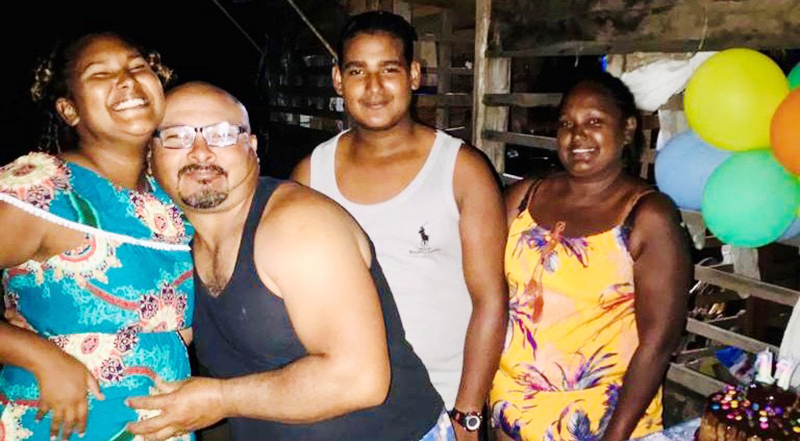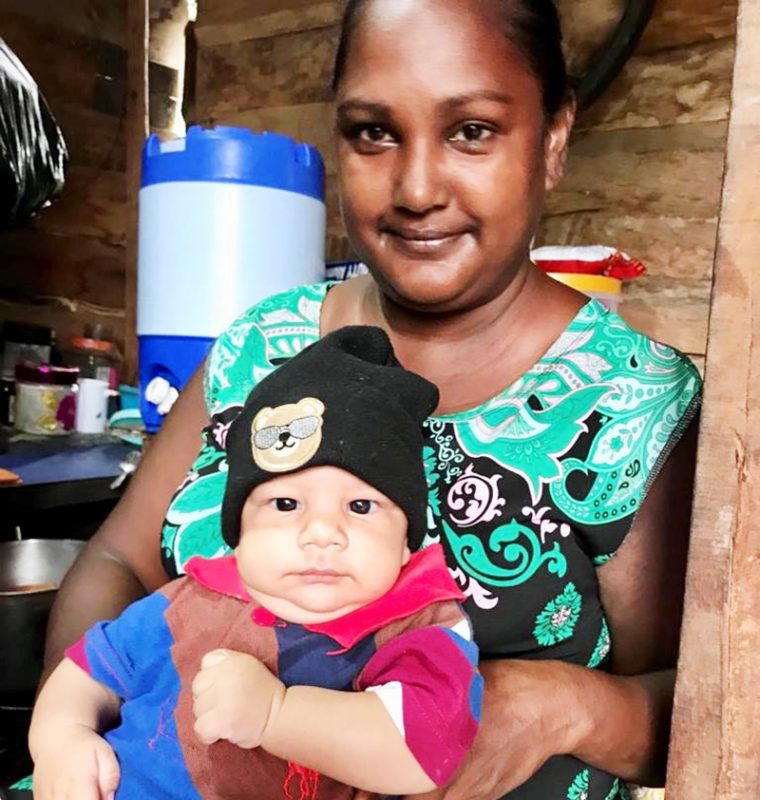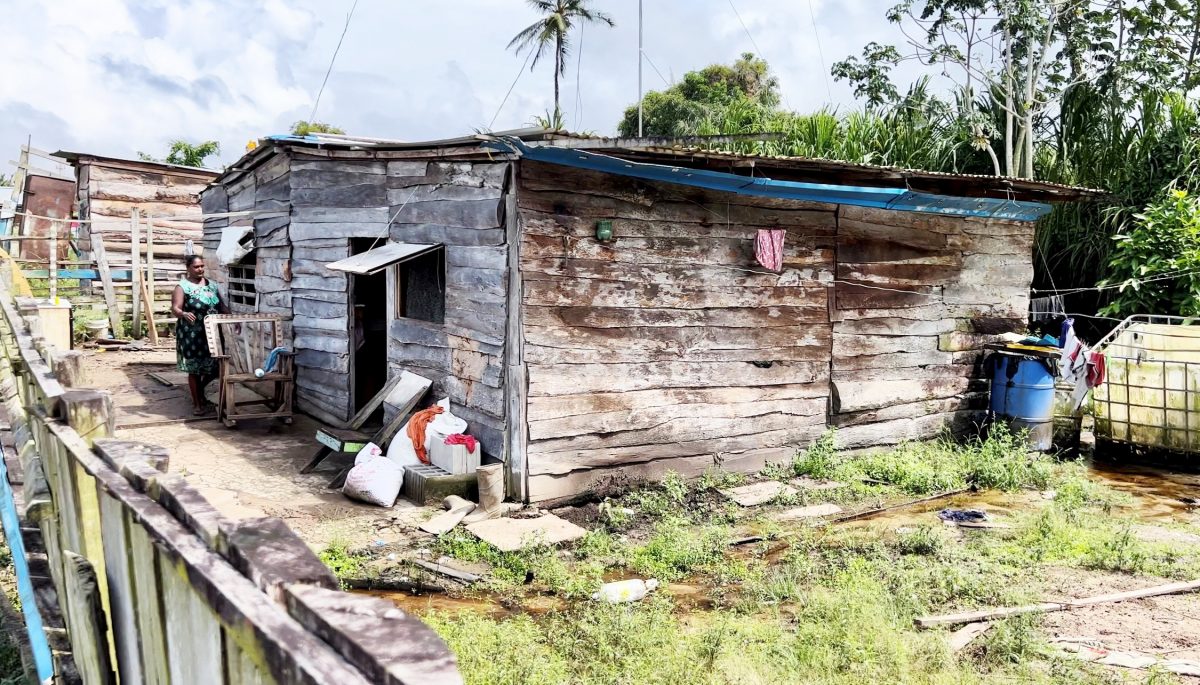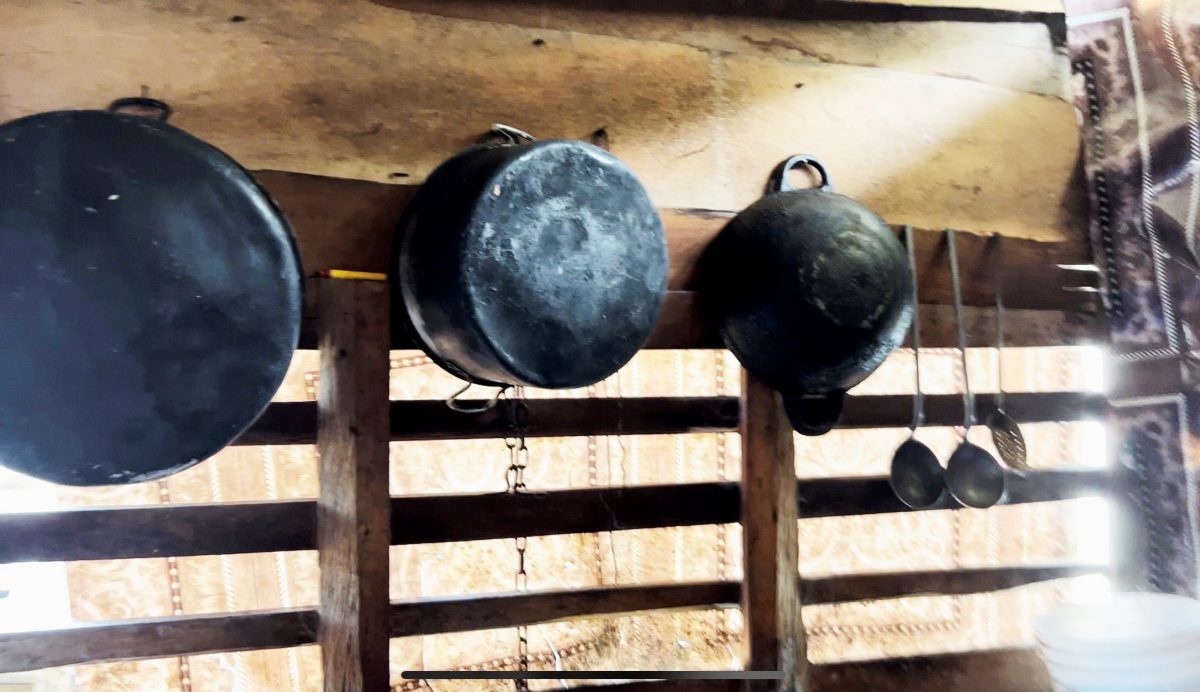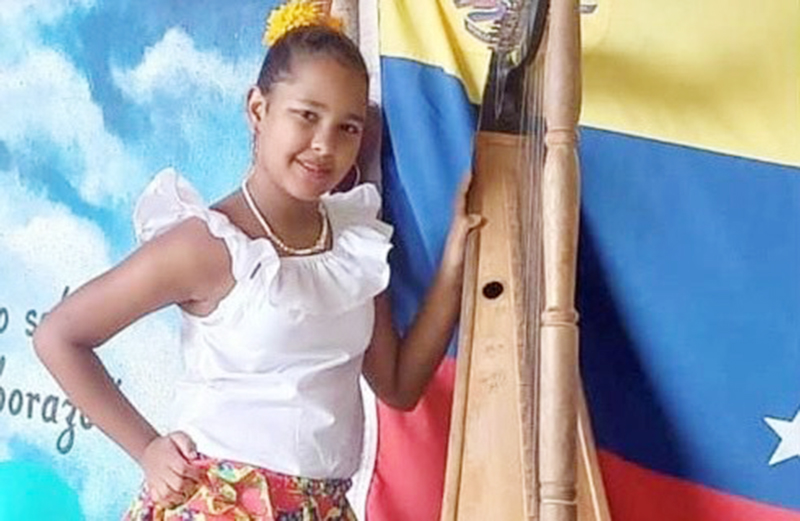When Verama Basdeo, 40, escaped the harsh economic crisis in Venezuela and returned to Guyana, she dreamed of a better life, but she can never achieve those dreams if she continues living on the Parika Sea Dam.
She fled in 2019 with her Venezuelan husband, Richard Moreno, 46, her son, Luiggi, now 18 and her now 21-year-old daughter, Nataly and ended up living in the depressed East Bank Essequibo community.
Nataly has a one-year-old son and is separated from her partner. Verama also has a 15-year-old daughter, Valeria, who was left behind with her grandmother because she (Verama) did not have the money to bring her. They would send a little money to support her.
The family battles constant flooding and badly wants the application for their house lot to be processed quickly so they can get a chance to improve their lives. Verama was confident that once she gets the opportunity to move out of the sea dam “We will make it…”
Verama’s parents, who are deceased, are from the Essequibo Coast. She was just a nine-month-old when her mother took her and her sister to Venezuela in search of a better life. A few years later her father joined them.
At one point her mother wanted to remigrate to Guyana but she was advised against it. During that time certain food items were banned in Guyana and people had to line up for hours to purchase groceries at the co-op centres and would only get limited quantities.
They never knew that one day Venezuela would become worse than that. Verama told Stabroek News (SN) that her family enjoyed a comfortable life before the Venezuelan economy collapsed in early 2015. It happened when the oil production dropped as a result of a lack of maintenance and investment in the sector.
In no time, life became tough; the country’s currency, the Bolivar, quickly started to decline in value, jobs were no longer available and there was a shortage of food, water and medical supplies.
To this day, most of the residents have had to join long lines and wait all day and all night to get food at the supermarkets. Verama’s sister who still lives there, told her that the distressing part is that by the time they finally get inside, the shelves would be empty. There would also be a long line of vehicles waiting to purchase gasoline and cooking gas.
The situation has caused seven million Venezuelans to migrate and seek refuge in different countries. An estimated 30,000 people, including Guyanese-Venezuelans, have moved to Guyana.
Since coming here, some of them have been successful in establishing businesses and living comfortable lives. There are many who are struggling like Verama and her family though, and some who are in much worse conditions.
At first Verama’s family rented a small house in another section of Parika for $20,000, even though it had no electricity nor water and it was very inconvenient. After their efforts to find a better place to rent with their limited budget failed, they decided to occupy a spot on the sea dam in the meantime.
Squatters
They joined other squatters, some of whom have been living on the sea dam for over 30 years. The residents are not supposed to squat there and as such, they will never benefit from good infrastructure.
They were encouraged to apply for house lots so they can relocate to other areas. Some residents applied a few years ago and are still waiting for approval, while a few others have gotten theirs and can’t afford to build. This newspaper learnt too that some people have sold their house lots just to remain on the sea dam because of job opportunities and the “hustle” from the boats that moor near their homes.
In a desperate bid to find somewhere else to live, they approached the owner of a sawmill and were very thankful to receive some free boards. With the little money that Verama’s son and her husband, who is a skilled mason earned, they laid a concrete flooring before building a flat wooden house.
It consists of two apartments, one for her daughter and the baby and the other, which has separate bedrooms, for her and her husband and a smaller one for her son.
She gave us a tour of her humble home because she wanted the public “to see how I’m living.” In her room, her husband built a bed as well as a cupboard to pack their clothes. But her children’s rooms have no bed. They sleep on the floor on thin sponges.
When it rains, her son’s room would get wet and when this newspaper visited, his ‘sponge’ was soaked and Verama had put it out in the sun to dry.
The back wall of the house has huge spaces in between because they did not have enough boards to put them closer. They used some of the boards to make shelves and counters in the kitchen.
Another section has their batteries that they use for the lights and internet connection.
In a corner near the kitchen are a few plastic barrels that she uses for storing water.
At the time of our visit, she was sitting outside by the door doing her son’s laundry from a tub. Opposite the door is a makeshift fireside that they use for cooking sometimes and for drying fish that her husband catches with hooks in the river.
Verama also gave us a tour of her waterlogged yard, and it was evident that they suffer constant flooding from rainfall and from the high tide.
We were impressed, that in spite of that, she still has a thriving fruit and vegetable garden. She has plants such as apples, pineapples, coconuts, bananas, cashews, soursop, bandanya and peppers. She had planted other vegetables as well but they could not survive the flood.
In a corner of the yard, was a makeshift bathroom they knocked up after another one had collapsed due to the constant flooding.
They are building a concrete washroom in another area. When asked why she was putting up a permanent structure when she would have to leave it, she responded that she did not mind and would leave it on the land since “the land give me purpose…”
Verama badly wants to improve her life and plans to use a glass case she received as a gift to start making food items to sell.
“I know to make many things; Guyanese food, Spanish food… I want to open my business… but I don’t have the money to invest…” she told this newspaper.
“Also, I want to get out of this sea dam and I want to get my own house lot so I can build a nice house. I don’t want to live so anymore, I want to get up in life.”
She recalled that she worked hard in Venezuela, making food items to sell at the school.
In the meantime, she is doing part-time domestic work and would also make chips to sell, so she can supplement her husband’s and son’s meagre income.
Verama’s husband has a disability in his leg, which was due to an accident, causing him to walk with a limp.
Even though it affects him, he tries to go about his normal activities and would build the bottom of his shoes up to match the other leg. This helps him to move around without limping.
She said her husband “loves Guyana because this country give him a job and give him food…” She is desperate for him to get his documents to stay here permanently but doesn’t know how to go about the process.
Verama was willing to share her story, and even though it is not a perfect one, she is trying to make the most out of her situation and hopes that it can inspire others to appreciate what they have.
